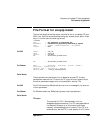
Appendix C 345
Configuring an Invokable TP Using snaptpinstall
File Format for snaptpinstall
File Format for snaptpinstall
The file that supplies configuration information for an invokable TP is an
ASCII text file that can be modified using any standard text editor. Each
entry in the file has the following format:
[TPname]
PATH = full_pathname_of_executable_file
ARGUMENTS = command-line_arguments_separated_by_spaces
TYPE = QUEUED | QUEUED-BROADCAST | NON-QUEUED
TIMEOUT = nnn
For UNIX USERID = user_ID
GROUP = group_ID
LUALIAS = LU_alias
ENV = environment_variable=value
.
.
.
ENV = environment_variable=value
For Windows SHOW = MAXIMIZED | MINIMIZED | HIDDEN | NORMAL |
NOACTIVATE | MINNOACTIVATE
SECURITY_TYPE = APPLICATION | SERVICE
SERVICE_NAME = name_of_installed_service
End of Section
The parameters are as follows. For an operator-started TP, the only
parameters used are the TP name, the TP type, and the timeout value;
the other parameters apply only to automatically started TPs.
For UNIX On HP-UX machines, SNAplus2 returns an error message if you enter an
invalid parameter.
For Windows On Window machines, SNAplus2 ignores invalid parameters.
End of Section
TPname
The name of the TP (1–64 characters, with no
embedded space characters). The TP name specified on
the Receive_Allocate, or on the incoming Allocate
request, is matched against this name. If the TP is an
automatically started TP, it must specify this TP name


















